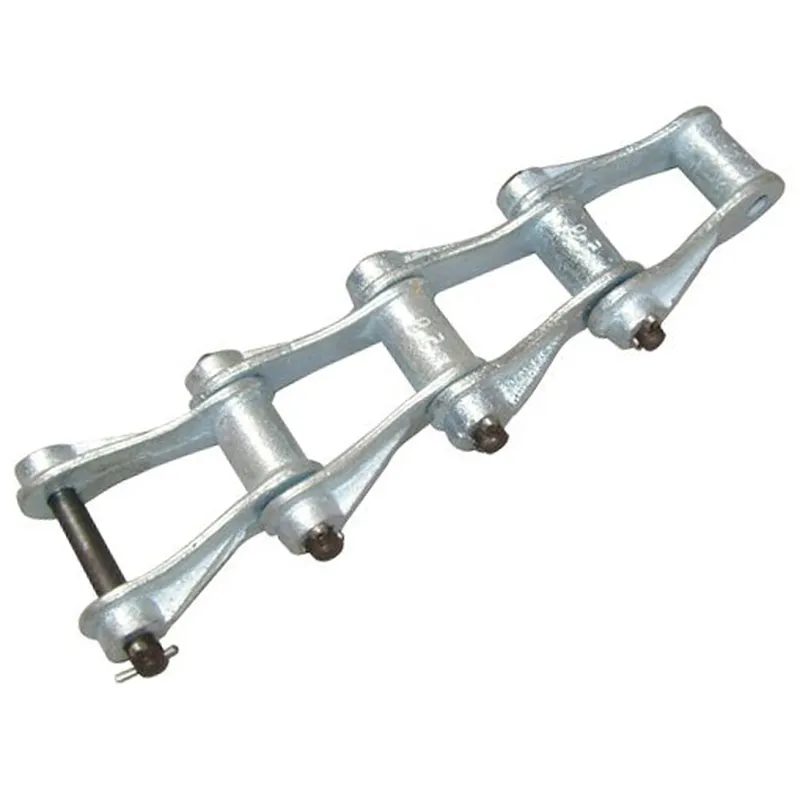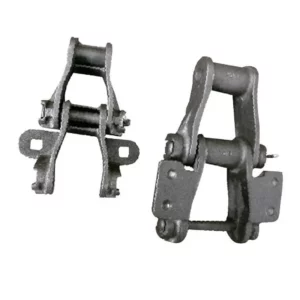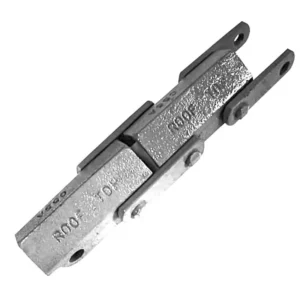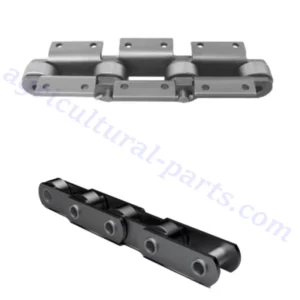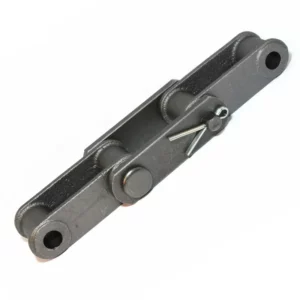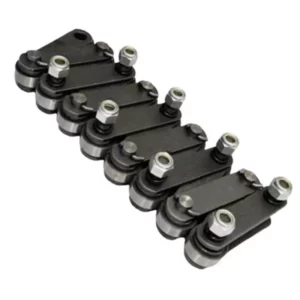DIN654 Class Pintle Chains 40 41 42 59 63 65 85 87 100 100A 100B 100D 135 135A 136
DIN 654 Class Pintle Chains are heavy-duty, moderately priced chains designed for handling average loads at slow to intermediate speeds. Typically made from malleable cast iron or steel, they feature a robust construction with link plates and load-bearing pins, ensuring balance, strength, and long service life. Their closed bearing design makes them ideal for conveying gritty or abrasive materials in applications like chain hoists, conveyors, and heavy industrial machinery. The chains are cast for pitch accuracy, reducing wear, and are compatible with cast iron, steel, or ductile iron sprockets.
DIN 654 Class Pintle Chains are heavy-duty, moderately priced chains designed for handling average loads at slow to intermediate speeds. Typically made from malleable cast iron or steel, they feature a robust construction with link plates and load-bearing pins, ensuring balance, strength, and long service life. Their closed bearing design makes them ideal for conveying gritty or abrasive materials in applications like chain hoists, conveyors, and heavy industrial machinery. The chains are cast for pitch accuracy, reducing wear, and are compatible with cast iron, steel, or ductile iron sprockets.
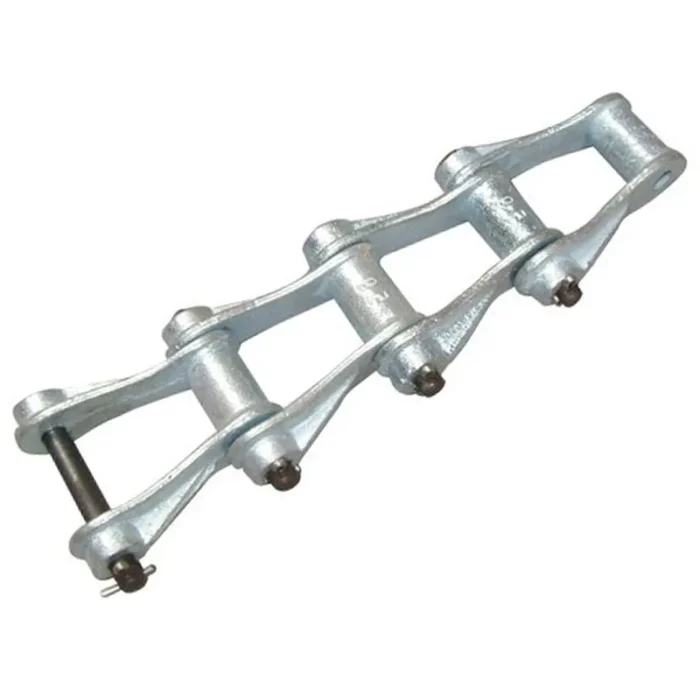
DIN654 Class Pintle Chain Dimensions
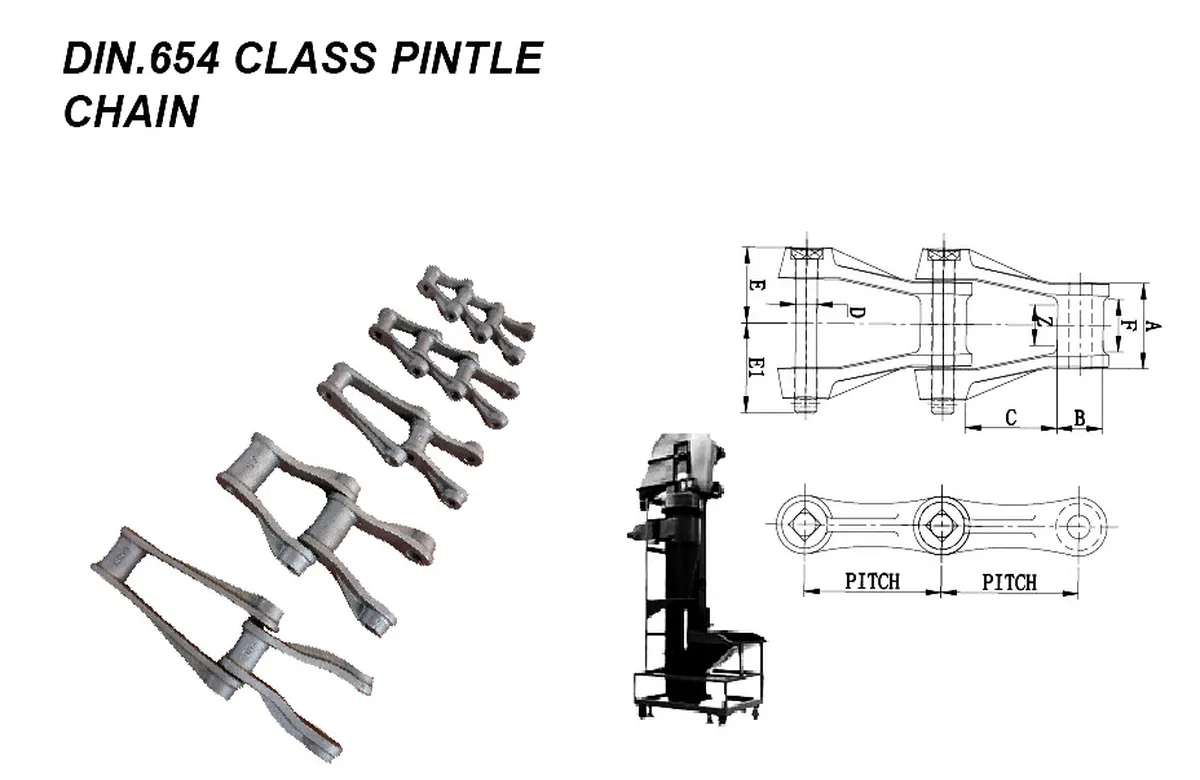
| DIN654 Chain No. | Pitch in Inches | A | B | C | D | E | E1 | F | Z | Maximum Working Load Kgs. | Average Ultimate Strength Kgs. | Weight Per Metre Kg. |
| 40 | 38.7 | 24 | 14 | 24.7 | 7 | 21 | 27 | 18 | 13 | 360.00 | 1800.00 | 2.1 |
| 41 | 41.5 | 28 | 17 | 24.5 | 8 | 25 | 33 | 25 | 14 | 600.00 | 1800.00 | 3.6 |
| 42 | 42 | 33 | 19 | 23 | 9 | 30 | 37 | 24.5 | 16 | 360.00 | 2300.00 | 4.5 |
| 59 | 59.5 | 38 | 21 | 38.5 | 9 | 34.5 | 43.5 | 29 | 20 | 460.00 | 2300.00 | 4.2 |
| 63 | 63 | 38.5 | 21 | 42 | 10 | 34 | 41 | 29 | 20 | 480.00 | 2400.00 | 4.2 |
| 65 | 65.5 | 44 | 25 | 40.5 | 12 | 40 | 50 | 26 | 23 | 760.00 | 3800.00 | 6.8 |
| 85 | 85 | 45 | 27 | 58 | 14 | 43 | 52 | 33 | 24 | 800.00 | 4000.00 | 7.7 |
| 87 | 87 | 60 | 35 | 52 | 17 | 54 | 66 | 45.5 | 32 | 1000.00 | 5000.00 | 12.0 |
| 100 | 100 | 42 | 23 | 77 | 12 | 37.5 | 47.5 | 32 | 23 | 600.00 | 3000.00 | 4.4 |
| 100A | 100 | 41 | 27 | 73 | 13 | 39.5 | 49.5 | 28 | 23 | 640.00 | 3200.00 | 5.5 |
| 100B | 100 | 54 | 30 | 70 | 15 | 51 | 59 | 40 | 32 | 900.00 | 4500.00 | 9.0 |
| 100D | 100 | 51 | 33.5 | 66.5 | 17 | 46 | 59 | 28 | 23 | 1320.00 | 6600.00 | 11.3 |
| 135 | 134.5 | 43 | 23 | 111.5 | 12 | 40 | 50 | 33.5 | 24 | 640.00 | 3200.00 | 4.1 |
| 135A | 135 | 47 | 27 | 108 | 15 | 44 | 54 | 33 | 24 | 700.00 | 3500.00 | 5.0 |
| 136 | 136.5 | 47 | 43 | 93.5 | 17 | 50 | 62 | 30.5 | 27 | 1200.00 | 6000.00 | 9.5 |
Key Advantages of DIN654 Class Pintle Chains
- Robust Construction for Heavy Loads: DIN654 Class Pintle Chains are engineered with malleable cast iron or steel, offering exceptional strength to handle heavy loads in demanding applications like chain hoists and conveyors, ensuring reliable performance under stress.
- Long Service Life: The chains are proportionately cast for balance and durability, with closed bearing construction that minimizes wear, providing extended service life even in abrasive environments, reducing replacement frequency and maintenance costs.
- Effective in Gritty Environments: Featuring closed bearing construction, these chains excel in conveying gritty and abrasive materials, preventing material buildup and reducing seizure risks, making them ideal for harsh industrial settings like mining or waste processing.
- Versatile Applications: These chains are adaptable for various uses, including chain hoists, conveyors, and heavy-duty industrial tasks, with compatibility across cast iron, steel, or ductile iron sprockets, enhancing their utility in diverse operational settings.
- Enhanced Wear Resistance: Through precise casting, machining, and surface treatment, the chains achieve superior wear and corrosion resistance, maintaining stable performance in challenging conditions like high humidity or chemical exposure, thus extending operational reliability.
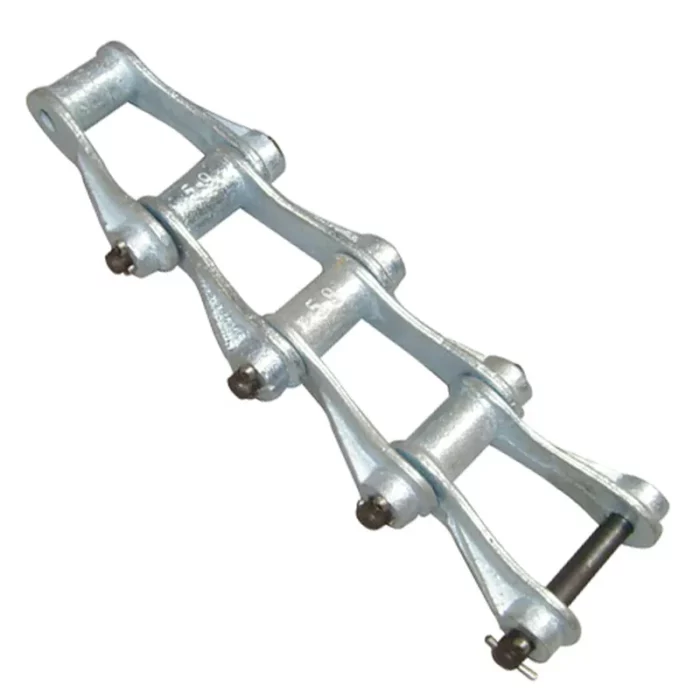
Applications of DIN654 Class Pintle Chains
DIN 654 Class Pintle Chains are robust, heavy-duty chains designed for handling average loads at slow to intermediate speeds, making them ideal for various industrial and agricultural applications. Here are some common applications:
- Chain Hoists: DIN 654 Class Pintle Chains are widely used in chain hoists for lifting heavy loads in industrial settings. Their malleable cast iron construction ensures durability and strength, while the closed bearing design handles gritty environments, making them reliable for consistent load-bearing tasks.
- Chain Conveyors: These chains excel in chain conveyors, moving materials along production lines in factories or warehouses. Their robust design and closed bearing construction allow them to transport gritty, abrasive materials efficiently, reducing wear and ensuring smooth operation over long distances.
- Bucket Elevators: In bucket elevators, DIN 654 Class Pintle Chains serve as tension members, conveying wet or abrasive materials like grain or cement. Their malleable iron composition provides flexibility and strength, ensuring reliable performance in harsh, high-load conditions.
- Agricultural Spreaders: These chains are utilized in manure, salt, or fertilizer spreaders, where crossbars or slats move materials. Their high-strength cast iron design resists corrosion and wear, ensuring durability in abrasive agricultural environments while maintaining efficient material distribution.
- Wastewater Treatment: DIN 654 Class Pintle Chains are employed in wastewater facilities for conveying and drive applications. Their corrosion-resistant properties and robust construction handle corrosive, gritty materials, ensuring long service life and reliable operation in harsh treatment processes.
- Sugar Mill Processing: In sugar mills, these chains facilitate material transport in harsh, abrasive conditions. Their high tensile strength and wear-resistant design ensure efficient conveying of cane or bagasse, minimizing downtime and enhancing harvesting rates.
- Mining Applications: These chains are used in mining for conveying heavy, abrasive materials. Their ability to withstand sudden load increases without breaking ensures safety and reliability in demanding environments, reducing the risk of operational failures.
 | 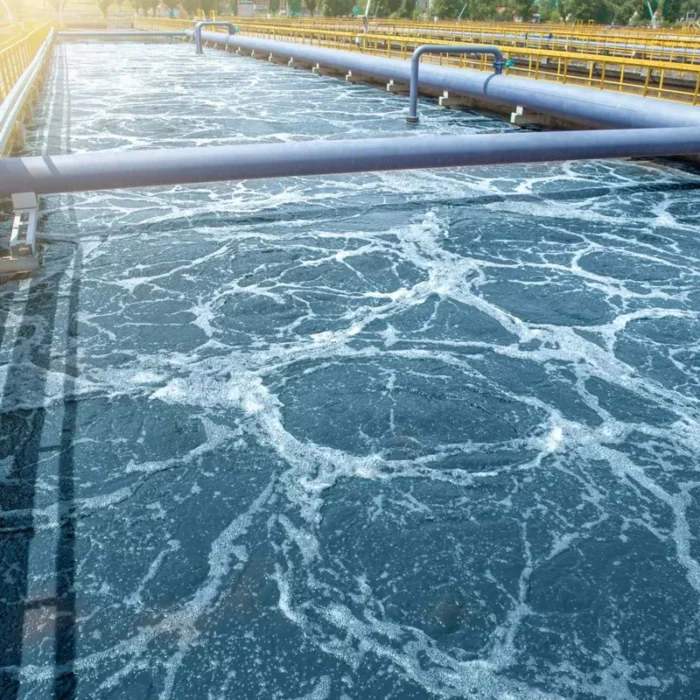 |
DIN654 Class Pintle Chain FAQ
Q: What materials are used in DIN 654 Class Pintle Chain?
A: The chain is typically constructed from malleable cast iron or steel. Links consist of cast link plates and load-bearing pins, which are machined for durability. Surface treatments enhance wear and corrosion resistance, making it suitable for harsh industrial environments like conveying abrasive materials.
Q: How is the DIN 654 Class Pintle Chain manufactured?
A: Manufacturing involves material preparation (cast iron or steel), casting links and pins, machining for precise dimensions, and surface treatment to improve wear and corrosion resistance. The process ensures pitch accuracy and smooth bearing surfaces, reducing break-in wear and extending service life in demanding applications.
Q: What are the key features of DIN 654 Class Pintle Chain?
A: It features a closed bearing construction, notched pin heads to prevent rotation, and cottered assembly for secure connections. With tensile strengths from 1,800 to 6,600 kg, it’s designed for balance, strength, and efficiency, making it ideal for gritty, abrasive material handling.
Q: What types of sprockets are compatible with this chain?
A: Compatible sprockets include cast iron for light-duty, steel for medium to heavy-duty, ductile iron for high strength, and double sprockets for dual-chain systems. Custom sprockets can be designed for specific needs, ensuring optimal performance in diverse applications.
Q: What maintenance is required for DIN 654 Class Pintle Chain?
A: Regular inspection for wear, lubrication to reduce friction, and cleaning to remove abrasive debris are essential. Check pins and links for damage, ensure proper tension, and replace worn components to maintain performance in heavy-duty applications like conveyors and hoists.
Additional information
| Edited by | Yjx |
|---|

